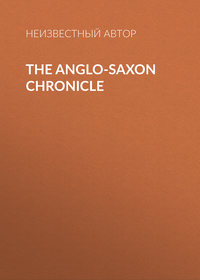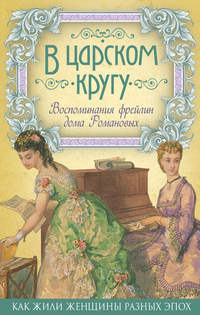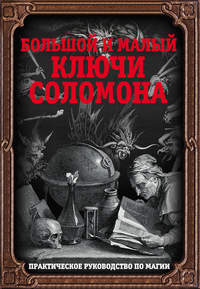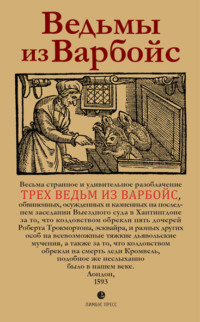Kalevala : the Epic Poem of Finland – Volume 02
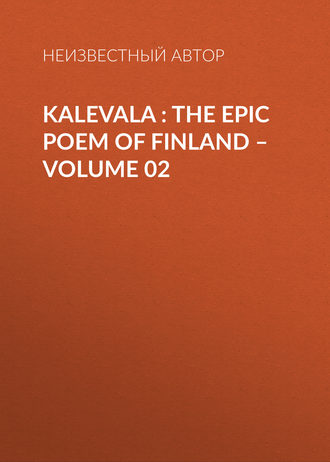 полная версия
полная версияKalevala : the Epic Poem of Finland – Volume 02
Жанр: зарубежная поэзиязарубежная классиказарубежная старинная литературастихи и поэзиясерьезное чтениеcтихи, поэзия
Язык: Английский
Год издания: 2019
Добавлена:
Настройки чтения
Размер шрифта
Высота строк
Поля
RUNE XXXIV
KULLERVO FINDS HIS TRIBE-FOLK
Kullerwoinen, young magician, In his beauteous, golden ringlets, In his magic shoes of deer-skin, Left the home of Ilmarinen Wandered forth upon his journey, Ere the blacksmith heard the tidings Of the cruel death and torture Of his wife and joy-companion, Lest a bloody fight should follow. Kullerwoinen left the smithy, Blowing on his magic bugle, Joyful left the lands of Ilma, Blowing blithely on the heather, Made the distant hills re-echo, Made the swamps and mountains tremble, Made the heather-blossoms answer To the music of his cow-horn, In its wild reverberations, To the magic of his playing. Songs were heard within the smithy, And the blacksmith stopped and listened, Hastened to the door and window, Hastened to the open court-yard, If perchance he might discover What was playing on the heather, What was sounding through the forest. Quick he learned the cruel story, Learned the cause of the rejoicing, Saw the hostess dead before him, Knew his beauteous wife had perished, Saw the lifeless form extended, In the court-yard of his dwelling. Thereupon the metal-artist Fell to bitter tears and wailings, Wept through all the dreary night-time, Deep the grief that settled o'er him, Black as night his darkened future, Could not stay his tears of sorrow. Kullerwoinen hastened onward, Straying, roaming, hither, thither, Wandered on through field and forest, O'er the Hisi-plains and woodlands. When the darkness settled o'er him, When the bird of night was flitting, Sat the fatherless at evening, The forsaken sat and rested On a hillock of the forest. Thus he murmured, heavy-hearted: "Why was I, alas! created, Why was I so ill-begotten, Since for months and years I wander, Lost among the ether-spaces? Others have their homes to dwell in, Others hasten to their firesides As the evening gathers round them: But my home is in the forest, And my bed upon the heather, And my bath-room is the rain-cloud. "Never didst thou, God of mercy, Never in the course of ages, Give an infant birth unwisely; Wherefore then was I created, Fatherless to roam in ether, Motherless and lone to wander? Thou, O Ukko, art my father, Thou hast given me form and feature; As the sea-gull on the ocean, As the duck upon the waters, Shines the Sun upon the swallow, Shines as bright upon the sparrow, Gives the joy-birds song and gladness, Does not shine on me unhappy; Nevermore will shine the sunlight, Never will the moonlight glimmer On this hapless son and orphan; Do not know my hero-father, Cannot tell who was my mother; On the shore, perhaps the gray-duck Left me in the sand to perish. Young was I and small of stature, When my mother left me orphaned; Dead, my father and my mother, Dead, my honored tribe of heroes; Shoes they left me that are icy, Stockings filled with frosts of ages, Let me on the freezing ice-plains Fall to perish in the rushes; From the giddy heights of mountains Let me tumble to destruction. "O, thou wise and good Creator, Why my birth and what my service? I shall never fall and perish On the ice-plains, in the marshes, Never be a bridge in swamp-land, Not while I have arms of virtue That can serve my honored kindred!" Then Kullervo thought to journey To the village of Untamo, To avenge his father's murder, To avenge his mother's tortures, And the troubles of his tribe-folk. These the words of Kullerwoinen: "Wait, yea wait, thou Untamoinen, Thou destroyer of my people; When I meet thee in the combat, I will slay thee and thy kindred, I will burn thy homes to ashes!" Came a woman on the highway, Dressed in blue, the aged mother, To Kullervo spake as follows: "Whither goest, Kullerwoinen, Whither hastes the wayward hero? Kullerwoinen gave this answer: "I have thought that I would journey To the far-off land of strangers, To the village of Untamo, To avenge my father's murder, To avenge my mother's tortures, And the troubles of my tribe-folk." Thus the gray-haired woman answered: "Surely thou dost rest in error, For thy tribe has never perished, And thy mother still is living With thy father in the Northland, Living with the old Kalervo." "O, thou ancient dame beloved, Worthy mother of the woodlands, Tell me where my father liveth, Where my loving mother lingers!" "Yonder lives thine aged father, And thy loving mother with him, On the farthest shore of Northland, On the long-point of the fish-lake!" "Tell me, O thou woodland-mother, How to journey to my people, How to find mine honored tribe-folk." "Easy is the way for strangers: Thou must journey through the forest, Hasten to the river-border, Travel one day, then a second, And the third from morn till even, To the north-west, thou must journey. If a mountain comes to meet thee, Go around the nearing mountain, Westward bold thy weary journey, Till thou comest to a river, On thy right hand flowing eastward; Travel to the river border, Where three water-falls will greet thee; When thou comest to a headland, On the point thou'lt see a cottage Where the fishermen assemble; In this cottage is thy father, With thy mother and her daughters, Beautiful thy maiden sisters." Kullerwoinen, the magician, Hastens northward on his journey, Walks one day, and then a second, Walks the third from morn till evening; To the north-west walks Kullervo, Till a mountain comes to meet him, Walks around the nearing mountain; Westward, westward, holds his journey, Till he sees a river coming; Hastens to the river border, Walks along the streams and rapids Till three waterfalls accost him; Travels till he meets a headland, On the point he spies a cottage, Where the fishermen assemble. Quick he journeys to the cabin, Quick he passes through the portals Of the cottage on the headland, Where he finds his long-lost kindred; No one knows the youth, Kullervo, No one knows whence comes the stranger, Where his home, nor where he goeth. These the words of young Kullervo: "Dost thou know me not, my mother, Dost thou know me not, my father? I am hapless Kullerwoinen Whom the heroes of Untamo Carried to their distant country, When my height was but a hand-breadth." Quick the hopeful mother answers: "O my worthy son, beloved, O my precious silver-buckle, Hast thou with thy mind of magic, Wandered through the fields of Northland Searching for thy home and kindred? As one dead I long have mourned thee, Had supposed thee, in Manala. Once I had two sons and heroes, Had two good and beauteous daughters, Two of these have long been absent, Elder son and elder daughter; For the wars my son departed, While my daughter strayed and perished If my son is home returning, Yet my daughter still is absent, Kullerwoinen asked his mother: "Whither did my sister wander, What direction did she journey? This the answer of the mother: "This the story of thy sister: Went for berries to the woodlands, To the mountains went my daughter, Where the lovely maiden vanished, Where my pretty berry perished, Died some death beyond my knowledge, Nameless is the death she suffered. Who is mourning for the daughter? No one mourns her as her mother, Walks and wanders, Mourns and searches, For her fairest child and daughter; Therefore did the mother wander, Searching for thy lovely sister, Like the bear she roamed the forest, Ran the glenways like the adder, Searched one day and then a second, Searched the third from morn till even, Till she reached the mountain-summit, There she called and called her daughter, Till the distant mountains answered, Called to her who had departed: I Where art thou, my lovely maiden, Come my daughter to thy mother!' "Thus I called, and sought thy sister, This the answer of the mountains, Thus the hills and valleys echoed: 'Call no more, thou weeping mother, Weep no more for the departed; Nevermore in all thy lifetime, Never in the course of ages, Will she join again her kindred, At her brother's landing-places, In her father's humble dwelling.'"RUNE XXXV
KULLERVO'S EVIL DEEDS
Kullerwionen, youthful wizard, In his blue and scarlet stockings, Henceforth lingered with his parents; But he could not change his nature, Could not gain a higher wisdom, Could not win a better judgment; As a child he was ill-nurtured, Early rocked in stupid cradles, By a nurse of many follies, By a minister of evil. To his work went Kullerwoinen, Strove to make his labors worthy; First, Kullervo went a-fishing, Set his fishing-nets in ocean; With his hands upon the row-locks, Kullerwoinen spake as follows: "Shall I pull with all my forces, Pull with strength of youthful heroes, Or with weakness of the aged?" From the stern arose a gray-beard, And he answered thus Kullervo: "Pull with all thy youthful vigor; Shouldst thou row with magic power, Thou couldst not destroy this vessel, Couldst not row this boat to fragments." Thereupon the youth, Kullervo, Rowed with all his youthful vigor, With the mighty force of magic, Rowed the bindings from the vessel, Ribs of juniper he shattered, Rowed the aspen-oars to pieces. When the aged sire, Kalervo, Saw the work of Kullerwoinen, He addressed his son as follows: "Dost not understand the rowing; Thou hast burst the bands asunder, Bands of juniper and willow, Rowed my aspen-boat to pieces; To the fish-nets drive the salmon, This, perchance, will suit thee better." Thereupon the son, Kullervo, Hastened to his work as bidden, Drove the salmon to the fish-nets, Spake in innocence as follows: "Shall I with my youthful vigor Scare the salmon to the fish-nets, Or with little magic vigor Shall I drive them to their capture? Spake the master of the fish-nets: "That would be but work of women, Shouldst thou use but little power In the frighting of the salmon!" Kullerwoinen does as bidden, Scares the salmon with the forces Of his mighty arms and shoulders, With the strength of youth and magic, Stirs the water thick with black-earth, Beats the scare-net into pieces, Into pulp he beats the salmon. When the aged sire, Kalervo, Saw the work of Kullerwoinen, To his son these words he uttered: "Dost not understand this labor, For this work thou art not suited, Canst not scare the perch and salmon To the fish-nets of thy father; Thou hast ruined all my fish-nets, Torn my scare-net into tatters, Beaten into pulp the whiting, Torn my net-props into fragments, Beaten into bits my wedges. Leave the fishing to another; See if thou canst pay the tribute, Pay my yearly contribution; See if thou canst better travel, On the way show better judgment!" Thereupon the son, Kullervo, Hapless youth in purple vestments, In his magic shoes of deer-skin, In his locks of golden color, Sallied forth to pay the taxes, Pay the tribute for his people. When the youth had paid the tribute, Paid the yearly contribution, He returned to join the snow-sledge, Took his place upon the cross-bench, Snapped his whip above the courser, And began his journey homeward; Rattled on along the highway, Measured as he galloped onward Wainamoinen's hills and valleys, And his fields in cultivation. Came a golden maid to meet him, On her snow-shoes came a virgin, O'er the hills of Wainamoinen, O'er his cultivated lowlands. Quick the wizard-son, Kullervo, Checked the motion of his racer, Thus addressed the charming maiden "Come, sweet maiden, to my snow-sledge, In my fur-robes rest and linger!" As she ran, the maiden answered: "Let the Death-maid sit beside thee, Rest and linger in thy fur-robes!" Thereupon the youth, Kullervo, Snapped his whip above the courser; Fleet as wind he gallops homeward, Dashes down along the highway; With the roar of falling waters, Gallops onward, onward, onward, O'er the broad-back of the ocean, O'er the icy plains of Lapland. Comes a winsome maid to meet him, Golden-haired, and wearing snow-shoes, On the far outstretching ice-plains; Quick the wizard checks his racer, Charmingly accosts the maiden, Chanting carefully these measures: "Come, thou beauty, to my snow-sledge, Hither come, and rest, and linger! Tauntingly the maiden answered: "Take Tuoni to thy snow-sledge, At thy side let Manalainen Sit with thee, and rest, and linger!" Quick the wizard, Kullerwoinen, Struck his fiery, prancing racer, With the birch-whip of his father. Like the lightning flew the fleet-foot, Galloped on the highway homeward; O'er the hills the snow-sledge bounded, And the coming mountains trembled. Kullerwoinen, wild magician, Measures, on his journey homeward, Northland's far-extending borders, And the fertile plains of Pohya. Comes a beauteous maid to meet him, With a tin-pin on her bosom, On the heather of Pohyola, O'er the Pohya-hills and moorlands. Quick the wizard son, Kullervo, Holds the bridle of his courser, Charmingly intones these measures: "Come, fair maiden, to my snow-sledge, In these fur-robes rest, and linger; Eat with me the golden apples, Eat the hazel-nut in joyance, Drink with me the beer delicious, Eat the dainties that I give thee." This the answer of the maiden With the tin-pin on her bosom: "I have scorn to give thy snow-sledge, Scorn for thee, thou wicked wizard; Cold is it beneath thy fur-robes, And thy sledge is chill and cheerless. Thereupon the youth, Kullervo, Wicked wizard of the Northland, Drew the maiden to his snow-sledge, Drew her to a seat beside him, Quickly in his furs enwrapped her; And the tin-adorned made answer, These the accents of the maiden: "Loose me from thy magic power, Let me leave at once thy presence, Lest I speak in wicked accents, Lest I say the prayer of evil; Free me now as I command thee, Or I'll tear thy sledge to pieces, Throw these fur-robes to the north-winds." Straightway wicked Kullerwoinen, Evil wizard and magician, Opens all his treasure-boxes, Shows the maiden gold and silver, Shows her silken wraps of beauty, Silken hose with golden borders, Golden belts with silver buckles, Jewelry that dims the vision, Blunts the conscience of the virgin. Silver leads one to destruction, Gold entices from uprightness. Kullerwoinen, wicked wizard, Flatters lovingly the maiden, One hand on the reins of leather, One upon the maiden's shoulder; Thus they journey through the evening, Pass the night in merry-making. When the day-star led the morning, When the second day was dawning, Then the maid addressed Kullervo, Questioned thus the wicked wizard: "Of what tribe art thou descended, Of what race thy hero-father? Tell thy lineage and kindred.` This, Kullervo's truthful answer: "Am not from a mighty nation, Not the greatest, nor the smallest, But my lineage is worthy: Am Kalervo's son of folly, Am a child of contradictions, Hapless son of cold misfortune. Tell me of thy race of heroes, Tell thine origin and kindred." This the answer of the maiden: "Came not from a race primeval, Not the largest, nor the smallest, But my lineage is worthy; Am Kalervo's wretched daughter, Am his long-lost child of error, Am a maid of contradictions, Hapless daughter of misfortune. "When a child I lived in plenty In the dwellings of my mother; To the woods I went for berries, Went for raspberries to uplands, Gathered strawberries on mountains, Gathered one day then a second; But, alas! upon the third day, Could not find the pathway homeward, Forestward the highways led me, All the footpaths, to the woodlands. Long I sat in bitter weeping, Wept one day and then a second, Wept the third from morn till even. Then I climbed a. lofty mountain, There I called in wailing accents, And the woodlands gave this answer, Thus the distant hills re-echoed: 'Call no longer, foolish virgin, All thy calls and tears are useless; There is none to give thee answer, Far away, thy home and people.' "On the third and on the fourth days, On the fifth, and sixth, and seventh, Constantly I sought to perish; But in vain were all my efforts, Could not die upon the mountains. If this wretched maid had perished, In the summer of the third year, She had fed earth's vegetation, She had blossomed as a flower, Knowing neither pain nor sorrow." Scarcely had the maiden spoken, When she bounded from the snow-sledge, Rushed upon the rolling river, To the cataract's commotion, To the fiery stream and whirlpool. Thus Kullervo's lovely sister Hastened to her own destruction, To her death by fire and water, Found her peace in Tuonela, In the sacred stream of Mana. Then the wicked Kullerwoinen Fell to weeping, sorely troubled, Wailed, and wept, and heavy-hearted, Spake these words in bitter sorrow: "Woe is me, my life hard-fated! I have slain my virgin-sister, Shamed the daughter of my mother; Woe to thee, my ancient father! Woe to thee, my gray-haired mother! Wherefore was I born and nurtured, Why this hapless child's existence? Better fate to Kullerwoinen, Had he never seen the daylight, Or, if born, had never thriven In these mournful days of evil! Death has failed to do his duty, Sickness sinned in passing by me, Should have slain me in the cradle, When the seventh day had ended!" Thereupon he slips the collar Of his prancing royal racer, Mounts the silver-headed fleet-foot, Gallops like the lightning homeward; Gallops only for a moment, When he halts his foaming courser At the cabin of his father. In the court-yard stood the mother, Thus the wicked son addressed her: "Faithful mother, fond and tender, Hadst thou slain me when an infant, Smoked my life out in the chamber, In a winding-sheet hadst thrown me To the cataract and whirlpool, In the fire hadst set my cradle, After seven nights had ended, Worthy would have been thy service. Had the village-maidens asked thee: 'Where is now the little cradle, Wherefore is the bath-room empty?' This had been a worthy answer: 'I have burned the wizard's cradle, Cast the infant to the fire-dogs; In the bath-room corn is sprouting, From the barley malt is brewing.'" Thereupon the aged mother Asks her wizard-son these questions: "What has happened to my hero, What new fate has overcome thee? Comest thou as from Tuoni, From the castles of Manala?" This, Kullervo's frank confession: "Infamous the tale I bring thee, My confession is dishonor: On the way I met a maiden, Met thy long-lost, wayward daughter, Did not recognize my sister, Fatal was the sin committed! When the taxes had been settled, When the tribute had been gathered, Came a matchless maid to meet me, Whom I witless led to sorrow, This my mother's long-lost daughter. When she saw in me her brother, Quick she bounded from the snow-sledge, Hastened to the roaring waters, To the cataract's commotion, To the fiery stream and whirlpool, Hastened to her full destruction. "Now, alas! must I determine, Now must find a spot befitting, Where thy sinful son may perish; Tell me, all-forgiving mother, Where to end my life of trouble; Let me stop the black-wolf's howling, Let me satisfy the hunger Of the vicious bear of Northland; Let the shark or hungry sea-dog Be my dwelling-place hereafter!" This the answer of the mother: "Do not go to stop the howling Of the hungry wolf of Northland; Do not haste to still the black-bear Growling in his forest-cavern; Let not shark, nor vicious sea-dog Be thy dwelling-place hereafter. Spacious are the rooms of Suomi, Limitless the Sawa-borders, Large enough to hide transgression, Man's misdeeds to hide for ages, With his sins and evil actions. Six long years man's sins lie hidden In the border-land of Kalma, Even nine for magic heroes, Till the years bring consolation, Till they quiet all his mourning." Kullerwoinen, wicked wizard, Answers thus his grieving mother: "I can never hide from sorrow, Cannot flee from my misconduct; To the jaws of death I hasten, To the open courts of Kalma, To the hunting-grounds of Pohya, To the battle-fields of heroes. Untamoinen still is living, Unmolested roams the wicked, Unavenged my father's grievance, Unavenged my mother's tortures, Unavenged the wrongs I suffer!"RUNE XXXVI
KULLERWOINEN'S VICTORY AND DEATH
Kullerwionen, wicked wizard, In his purple-colored stockings, Now prepares himself for battle; Grinds a long time on his broadsword, Sharpens well his trusty weapon, And his mother speaks as follows: "Do not go, my son beloved, Go not to the wars, my hero, Struggle not with hostile spearsmen. Whoso goes to war for nothing, Undertakes a fearful combat, Undertakes a fatal issue; Those that war without a reason Will be slaughtered for their folly, Easy prey to bows and arrows. Go thou with a goat to battle, Shouldst thou go to fight the roebuck, 'Tis the goat that will be vanquished, And the roebuck will be slaughtered; With a frog thou'lt journey homeward, Victor, with but little honor!" These the words of Kullerwoinen: "Shall not journey through the marshes, Shall not sink upon the heather, On the home-land of the raven, Where the eagles scream at day-break. When I yield my life forever, Bravely will I fall in battle, Fall upon the field of glory, Beautiful to die in armor, And the clang and clash of armies, Beautiful the strife for conquest! Thus Kullervo soon will hasten To the kingdom of Tuoni, To the realm of the departed, Undeformed by wasting sickness." This the answer of the mother: "If thou diest in the conflict, Who will stay to guard thy father, Who will give thy sire protection?" These the words of Kullerwoinen: "Let him die upon the court-yard, Sleeping out his life of sorrow!" "Who then will protect thy mother, Be her shield in times of danger?" "Let her die within the stable, Or the cabin where she lingers!" "Who then will defend thy brother, Give him aid in times of trouble?" "Let him die within the forest, Sleep his life away unheeded!" "Who will comfort then thy sister, Who will aid her in affliction?" "Let her sink beneath the waters, Perish in the crystal fountain, Where the brook flows on in beauty, Like a silver serpent winding Through the valley to the ocean!" Thereupon the wild Kullervo Hastens from his home to battle, To his father speaks, departing: "Fare thou well, my aged father! Wilt thou weep for me, thy hero, When thou hearest I have perished, Fallen from thy tribe forever, Perished on the field of glory?" Thus the father speaks in answer: "I shall never mourn the downfall Of my evil son, Kullervo; Shall not weep when thou hast perished; Shall beget a second hero That will do me better service, That will think and act in wisdom." Kullerwoinen gives this answer: "Neither shall I mourn thy downfall, Shall not weep when thou hast perished; I shall make a second father, Make the head from loam and sandstone, Make the eyes from swamp-land berries, Make the beard from withered sea-grass, Make the feet from roots of willow, Make the form from birch-wood fungus." Thereupon the youth, Kullervo, To his brother speaks as follows: "Fare thou well, beloved brother! Wilt thou weep for me departed, Shouldst thou hear that I have perished, Fallen on the field of battle?" This the answer of the brother: "I shall never mourn the downfall Of my brother, Kullerwoinen, Shall not weep when thou hast perished; I shall find a second brother; Find one worthier and wiser!" This is Kullerwoinen's answer: "Neither shall I mourn thy downfall, Shall not weep when thou hast perished; I shall form a second brother, Make the head from dust and ashes, Make the eyes from pearls of ocean, Make the beard from withered verdure, Make the form from pulp of birch-wood." To his sister speaks Kullervo: "Fare thou well, beloved sister! Surely thou wilt mourn my downfall, Weep for me when I have perished, When thou hearest I have fallen In the heat and din of battle, Fallen from thy race forever!" But the sister makes this answer: "Never shall I mourn thy downfall, Shall not weep when thou hast perished; I shall seek a second brother, Seek a brother, purer, better, One that will not shame his sister!" Kullerwoinen thus makes answer: "Neither shall I mourn thee fallen, Shall not weep when thou hast perished; I shall form a second sister, Make the head from whitened marble, Make the eyes from golden moonbeams, Make the tresses from the rainbow, Make the ears from ocean-flowers, And her form from gold and silver. "Fare thou well, beloved mother, Mother, beautiful and faithful! Wilt thou weep when I have perished, Fallen on the field of glory, Fallen from thy race forever?" Thus the mother speaks in answer: "Canst not fathom love maternal, Canst not smother her affection; Bitterly I'll mourn thy downfall, I would weep if thou shouldst perish, Shouldst thou leave my race forever; I would weep in court or cabin, Sprinkle all these fields with tear-drops, Weep great rivers to the ocean, Weep to melt the snows of Northland, Make the hillocks green with weeping, Weep at morning, weep at evening, Weep three years in bitter sorrow O'er the death of Kullerwoinen!" Thereupon the wicked wizard Went rejoicing to the combat; In delight to war he hastened O'er the fields, and fens, and fallows, Shouting loudly on the heather, Singing o'er the hills and mountains, Rushing through the glens and forests, Blowing war upon his bugle. Time had gone but little distance, When a messenger appearing, Spake these words to Kullerwoinen: "Lo! thine aged sire has perished, Fallen from thy race forever; Hasten home and do him honor, Lay him in the lap of Kalma." Kullerwoinen inade this answer: "Has my aged father perished, There is home a sable stallion That will take him to his slumber, Lay him in the lap of Kalma." Then Kullervo journeyed onward, Calling war upon his bugle, Till a messenger appearing, Brought this word to Kullerwoinen: "Lo! thy brother too has perished, Dead he lies within the forest, Manalainen's trumpet called him; Home return and do him honor, Lay him in the lap of Kalma." Kullerwoinen thus replying: "Has my hero-brother perished, There is home a sable stallion That will take him' to his slumber, Lay him in the lap of Kalma." Young Kullervo journeyed onward Over vale and over mountain, Playing on his reed of battle, Till a messenger appearing Brought the warrior these tidings: "Lo! thy sister too has perished, Perished in the crystal fountain, Where the waters flow in beauty, Like a silver serpent winding Through the valley to the ocean; Home return and do her honor, Lay her in the lap of Kalma." These the words of Kullerwoinen: "Has my beauteous sister perished, Fallen from my race forever, There is home a sable filly That will take her to her resting, Lay her in the lap of Kalma." Still Kullervo journeyed onward, Through the fens he went rejoicing, Sounding war upon his bugle, Till a messenger appearing Brought to him these words of sorrow: "Lo! thy mother too has perished, Died in anguish, broken-hearted; Home return and do her honor, Lay her in the lap of Kalma." These the measures of Kullervo: "Woe is me, my life hard-fated, That my mother too has perished, She that nursed me in my cradle, Made my couch a golden cover, Twirled for me the spool and spindle! Lo! Kullervo was not present When his mother's life departed; May have died upon the mountains, Perished there from cold and hunger. Lave the dead form of my mother In the crystal waters flowing; Wrap her in the robes of ermine, Tie her hands with silken ribbon, Take her to the grave of ages, Lay her in the lap of Kalma. Bury her with songs of mourning, Let the singers chant my sorrow; Cannot leave the fields of battle While Untamo goes unpunished, Fell destroyer of my people." Kullerwoinen journeyed onward, Still rejoicing, to the combat, Sang these songs in supplication: "Ukko, mightiest of rulers, Loan to me thy sword of battle, Grant to me thy matchless weapon, And against a thousand armies I will war and ever conquer." Ukko, gave the youth his broadsword, Gave his blade of magic powers To the wizard, Kullerwoinen. Thus equipped, the mighty hero Slew the people of Untamo, Burned their villages to ashes; Only left the stones and ovens, And the chimneys of their hamlets. Then the conqueror, Kullervo, Turned his footsteps to his home-land, To the cabin of his father; To his ancient fields and forests. Empty did he find the cabin, And the forests were deserted; No one came to give him greeting, None to give the hand of welcome; Laid his fingers on the oven, But he found it cold and lifeless; Then he knew to satisfaction That his mother lived no longer; Laid his hand upon the fire-place, Cold and lifeless were the hearth-stones; Then he knew to satisfaction That his sister too had perished; Then he sought the landing-places, Found no boats upon the rollers; Then he knew to satisfaction That his brother too had perished; Then he looked upon the fish-nets, And he found them torn and tangled; And he knew to satisfaction That his father too had perished. Bitterly he wept and murmured, Wept one day, and then a second, On the third day spake as follows: "Faithful mother, fond and tender, Why hast left me here to sorrow In this wilderness of trouble? But thou dost not hear my calling, Though I sing in magic accents, Though my tear-drops speak lamenting, Though my heart bemoans thine absence. From her grave awakes the mother, To Kullervo speaks these measures: "Thou has still the dog remaining, He will lead thee to the forest; Follow thou the faithful watcher, Let him lead thee to the woodlands, To the farthest woodland border, To the caverns of the wood-nymphs; Kullerwoinen's Victory and Death There the forest maidens linger, They will give thee food and shelter, Give my hero joyful greetings." Kullerwoinen, with his watch-dog, Hastens onward through the forest, Journeys on through fields and fallows; Journeys but a little distance, Till he comes upon the summit Where he met his long-lost sister; Finds the turf itself is weeping, Finds the glen-wood filled with sorrow, Finds the heather shedding tear-drops, Weeping are the meadow-flowers, O'er the ruin of his sister. Kullerwoinen, wicked wizard, Grasps the handle of his broadsword, Asks the blade this simple question: "Tell me, O my blade of honor, Dost thou wish to drink my life-blood, Drink the blood of Kullerwoinen?" Thus his trusty sword makes answer, Well divining his intentions: Why should I not drink thy life-blood, Blood of guilty Kullerwoinen, Since I feast upon the worthy, Drink the life-blood of the righteous?" Thereupon the youth, Kullervo, Wicked wizard of the Northland, Lifts the mighty sword of Ukko, Bids adieu to earth and heaven; Firmly thrusts the hilt in heather, To his heart he points the weapon, Throws his weight upon his broadsword, Pouring out his wicked life-blood, Ere be journeys to Manala. Thus the wizard finds destruction, This the end of Kullerwoinen, Born in sin, and nursed in folly. Wainamoinen, ancient minstrel, As he hears the joyful tidings, Learns the death of fell Kullervo, Speaks these words of ancient wisdom: "O, ye many unborn nations, Never evil nurse your children, Never give them out to strangers, Never trust them to the foolish! If the child is not well nurtured, Is not rocked and led uprightly, Though he grow to years of manhood, Bear a strong and shapely body, He will never know discretion, Never eat. the bread of honor, Never drink the cup of wisdom."





